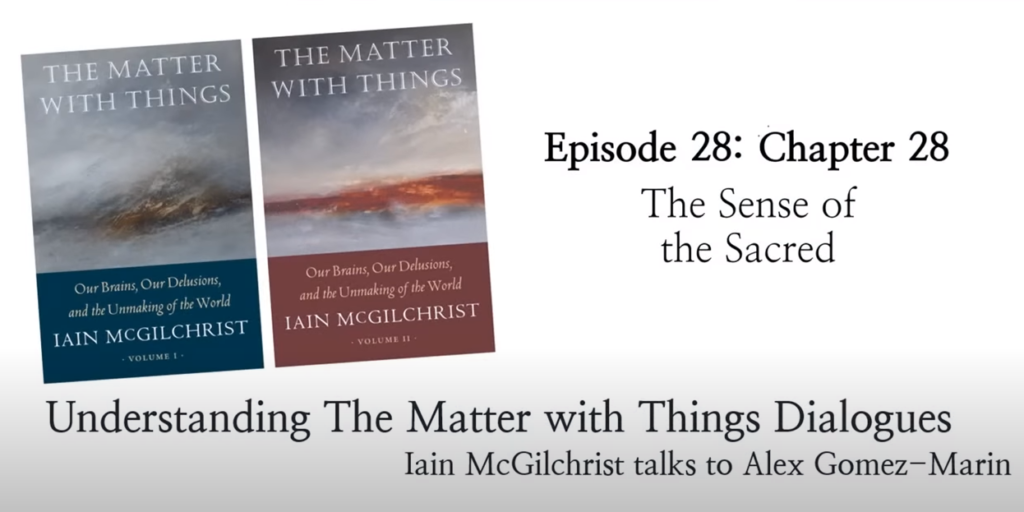
(It is a bit unusual for a psychiatrist and scientist to dare to talk of the sacred; McGilchrist grounds his views with a thorough understanding of neurology and how the brain perceives the world.)
“Our Brains, Our Delusions, an the Unmaking of the World“
A review from the Los Angeles Time: “The Myths We Live By”
There can be no denying that this, like McGilchrist’s earlier work, is a genuinely groundbreaking and exceptionally important challenge to what Mary Midgley, in a book very much in tune with this, called “the myths we live by” in North Atlantic modernity/late modernity/postmodernity. This is the era of “infotainment,” egregious public lies, corrosive cynicism, scientific fundamentalism, the barbaric functionalizing of education, and the Balkanization of public argument.
As McGilchrist’s subtitle tells us, we live in a world that is being “unmade” — not just corrupted here and there, but dismantled as a meaningful, intelligible environment in relation to which we are able to build models of human life that have some dignity and durability. We are losing the capacity to think honestly about ourselves, so it is hardly surprising that we shrink from facing the truth about the physical world we belong to and continue to abuse and unravel it.
In the long run, I imagine, McGilchrist would say that this is an unforgivingly big book because his subject matter is unforgivingly urgent and complex. And he addresses this with an extraordinary blend of detailed clinical evidence, a keen eye for the illusions of popular culture, a style of exemplary simplicity and energy, and a consistent moral passion. (Click to go to full article)
A good summary from WIkipedia:
The Matter with Things: Our Brains, Our Delusions, and the Unmaking of the World is a 2021 book of neuroscience, epistemology and metaphysics written by psychiatrist, thinker and former literary scholar Iain McGilchrist.
Following on from McGilchrist’s 2009 work, The Master and His Emissary: The Divided Brain and the Making of the Western World, The Matter with Things explores the radically different worldviews presented by the two hemispheres of the brain, and the many cognitive and worldly implications of this.
The book “is an attempt to convey a way of looking at the world quite different from the one that has largely dominated the West for at least three hundred and fifty years [ie. since the Scientific Revolution and the Enlightenment some would say as long as two thousand years.”
Overview
The work is 1,500 pages long and divided into two volumes – “The Ways to Truth” and “What Then is True?” – with many scientific, philosophical and literary quotations, citations and footnotes, and several appendices. The bibliography alone is 180 pages long.
Basic premise: The divided brain
McGilchrist distances himself from the discourse about the left brain–right brain divide in pop psychology, writing that “just about everything that is said about the hemispheres in pop psychology is wrong because it rests on beliefs about what the hemispheres do, not about how they approach it.”
One of the fundamental differences between the hemispheres of the human brain (and that of other species, such as birds), according to McGilchrist is that the left hemisphere has evolved to sharply focus its attention on detail; it breaks things apart and tends to deal in abstractions, the explicit, and “either/or” (differentiation). The right hemisphere, on the other hand, has a broad and flexible attention that is open to whatever possibilities come along, and it sees things in their wider context, appreciates the implicit, and favours “both/and” (integration, holism). The right hemisphere has a better appreciation of itself and the left, than the left has of the right. Both approaches are necessary and complementary, but the left hemisphere’s operation should not dominate the rightIt makes “a good servant, but a very poor master.”
McGilchrist writes:
“[Y]ou could say, to sum up a vastly complex matter in a phrase, that the brain’s left hemisphere is designed to help us ap-prehend – and thus manipulate – the world; the right hemisphere to com-prehend it – see it all for what it is.”
He believes that “nowadays we live no longer in the presence of the world, but rather in a re-presentation of it. The significance of that is that the left hemisphere’s task is to ‘re-present’ what first ‘presences’ to the right hemisphere.”
McGilchrist argues that the Western world has “oscillated” between predominantly left-brain and predominantly right-brain function through history, with some periods of relative balance. During certain periods such as the Renaissance, there was a movement toward the right, whereas since the Scientific Revolution and the Age of Enlightenment – with exceptions such as the Romantic movement – it has become increasingly left-brain dominant, and in light of this, McGilchrist is concerned about the many cultural and global crises that we now face. (Click to go to Wikipedia article)
